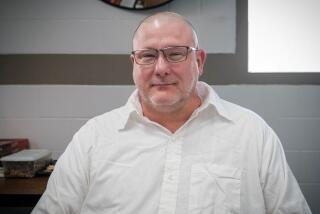Broderick Sentence Could Be 17 Years, Her Attorney Says : Courts: Judge has option of giving Betty Broderick concurrent sentences rather than consecutive, cutting jail term in half.
- Share via
Elisabeth Anne (Betty) Broderick could be sentenced to as few as 17 years for killing her ex-husband and his second wife if the judge chooses to impose the most lenient sentence, Broderick’s attorney said Thursday.
Jack Earley, who represented Broderick in both of her murder trials, said it was “incorrect” to assume that Broderick would serve consecutive sentences for second-degree murder when the judge has the option of making the sentences concurrent.
San Diego County Dist. Atty. Edwin Miller said Tuesday, after Broderick was convicted of two counts of second-degree murder, that she would serve 32 years to life, taking into account use of a firearm in committing a felony and time already served.
But Earley said Broderick would serve 32 years to life only if Superior Court Judge Thomas J. Whelan chooses to make the sentences consecutive and not concurrent. Earley said much of his argument on Feb. 7, Broderick’s sentencing date, will be for concurrent sentences.
“To me, 17 years to life is the only appropriate sentence, because everything connected with the crime took place in such a short period of time, and the jury clearly saw that it was not premeditated, first-degree murder,” Earley said. “By making the sentences consecutive, the judge would be saying, in essence, ‘I disagree with the jury.’
“This (the killings) was obviously not planned. It was a single moment and should be viewed as such.”
But Steven J. Casey, special assistant to the district attorney, said Thursday that the most compelling argument is for consecutive--rather than concurrent--sentences. However, Earley is right, Casey said, in saying the judge has the option.
“That will be an issue at the sentencing,” Casey said. “I’m sure he will ask for concurrent sentences, but we will just as vehemently oppose that, arguing that she doesn’t get to kill anyone for free. In our view, there is no free murder, and thus it has to be consecutive sentences.”
Casey said Broderick must serve two-thirds of her sentence before “being even statutorily eligible for parole, and nobody gets out when they’re first being considered.” With a 32-year sentence, Casey said the earliest she could be paroled is in 19 years.
With a 17-year sentence, “my hunch is she’d have to do eight or nine (years) before she could even apply,” he said.
Broderick, 44, was convicted of two counts of second-degree murder for the Nov. 5, 1989, slayings of her ex-husband, prominent lawyer Daniel T. Broderick III, 44, and Linda Kolkena Broderick, 28, his wife of six months. Last year’s trial ended in a hung jury.
Casey, Earley and a spokesman for the State Department of Corrections said Broderick would most likely be sentenced to the California Institution for Women in Frontera, near Ontario. She must first report to Frontera, even if she’s later assigned to another facility.
Lt. Floyd Huyler, public information officer at Frontera, said it was the most overcrowded prison in the state until the recent opening of a new women’s facility near Chowchilla. He said Broderick could end up in that prison, although Frontera was the most likely site.
Huyler said the Frontera facility, built in 1952 for 911 inmates, reached a peak of 2,800 during 1990, when the prison came under intense scrutiny from a state legislative committee for poor medical care, drug trafficking and charges of sexual assaults by inmates and staff members.
Huyler said 1,785 women are currently housed at Frontera, where conditions have improved, in his words, because of increased staffing and numerous personnel changes.
Huyler said Frontera is smoggy and hot in the summer and that 21% of its inmates are convicted murderers. They include three women involved in the Manson family slayings. He said the remaining 79% of the inmate population is “in for drug- and property-related crimes.”
Huyler said that, if assigned to Frontera, Betty Broderick could expect “continued media attention the first year, but then it dies off fairly rapidly. That’s what happened with the Manson women and other high-profile inmates we’ve happened to have.”
He said she could obtain free psychotherapy at Frontera, from psychiatrists, psychologists or psychiatric social workers and through group or individual counseling.
He said the prison offers programs in computer programming, plumbing, reupholstery and clothing and textile manufacturing. He said Broderick could end up, like many of the other inmates, making shirts for state highway workers.
He said most inmates--including the members of the Manson family--are housed “in the general population” without being allowed special quarters.
Earley, Betty Broderick’s attorney, said the Frontera prison, off California 71 in San Bernardino County, is “an awful place. It’s so overcrowded. Women are just thrown into one place, and it’s very difficult. It’s a dangerous and hostile environment.”
Even so, Earley believes Broderick “will do better there than she ever did at (the Las Colinas Women’s Detention Facility in Santee). At least, the people who work there won’t be interested in creating any more problems than they already have.
“Betty got along fine in jail--with other inmates. It was just a few deputies who seemed to want problems, who then made it difficult for her.”
Earley said some of Broderick’s other legal problems involve pending litigation, including a suit from a San Diego County sheriff’s deputy who alleges Broderick injured her in a jailhouse scuffle. Deputy Michele St. Clair is seeking more than $25,000 in the suit.
Earley said unresolved matters include appeals related to Betty Broderick’s divorce from Daniel Broderick and the custody of their four children, as well as the appeal of Lee Broderick, the couple’s 20-year-old daughter, who was cut out of her father’s will after incurring a high-school drug problem.
Broderick herself said in an interview with The Times Wednesday night that pending litigation, as well as the looming sentence, are her biggest concerns.
“It’s all just pressure, pressure, pressure,” she said by telephone from jail. “Look at the pressure the judge is under, and which I’m under. Look at my history. A judge had discretion over custody of my children--I got nailed. A judge had discretion over my divorce and the millions of dollars of (community property) I lost--I got nailed. And now a judge has discretion over the rest of my life, and he’s under considerable pressure.”
Earley said his concern was that Judge Whelan would be influenced by attorneys in the San Diego legal community--many of whom were Daniel Broderick’s friends--to impose the harshest possible sentence. He said he had seen published comments by several attorneys that they were “confident” of a stiff sentence.
“The message seems to be, ‘We are confident, because he is one of us,’ ” Earley said. “But the question is, do you bend to the pressure because of who these people are? There’s no question that there’s a lot of pressure.”
More to Read
Sign up for Essential California
The most important California stories and recommendations in your inbox every morning.
You may occasionally receive promotional content from the Los Angeles Times.













